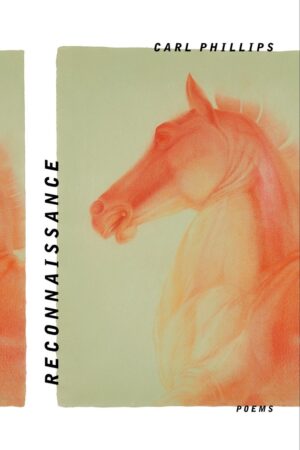Reconnaissance
by Carl Phillips
reviewed by Wesley Rothman
Reconnaissance of what, of whom? Cruelty, as is considered in the title poem? Trouble, risk, whatever they can mean? Permanence or impermanence, how they function physically and immaterially? Carl Phillips reckons how a lover shaped the speaker’s world and how the speaker’s world morphs in the lover’s wake into estrangement covered with grief. We hear some of this in “Permission to Speak”:
And if I be torn?
And if torn means mendable?
And the wayward mission of your body
be a needle’s mission, up and through
my own?How softly the after comes
loose, unraveling, until it’s just
before
This is reconnaissance of the self and the veracity of its positions in the world, “[w]hat I’ve called the world,” a person’s power to interpret—or the illusion of that power, and that illusion’s very real effects. Phillips’s poems wander precisely through the speaker’s epistemology. And this is characteristic of Phillips’s form: a precise wandering in which every line break, stanza, and punctuation mark offers a deliberate and unfamiliar veering. We hear the speaker doubting his existing perspective, how tying his world to a lover caused one set of perceptions and determinations, but now how, without that lover, the world is utterly changed. Reconnaissance reconsiders how one makes sense of the world, knowing that that reconsideration may not hold for long. Phillips holds us steadily in a state of doubt, a place where we’re asked to wonder how certain we can or should be, a place where the poet wants us to revel in that unsureness, as we witness in “Steeple”:
Shining,
everyone shining like that, as if reality itself depended
on a nakedness as naked as naked gets; on a faith in each
other as mistaken as mistaken tends to be, though I have
loved the mistake of it—still do
We are encouraged to appreciate risk, embrace it, or imagine what embracing it might yield (as the speaker seems to), and we are brought to a frightening threshold of accountability. The speaker casts a litany of confessions throughout the collection, as in “For Long to Hold”:
I’ve been wrong about more than, despite
memory, I had thought was possible
and with “The Strong by Their Stillness”:
You can love a man
more than he’ll ever love back or be able to, you can confuse
your understanding of that
with a thing like acceptance or,
worse, all you’ve ever deserved
Phillips’s patient, mellow insights are a signature of his poetry, as is his origami syntax. The challenge of the language and form is woven by a pristine clarity of thought—a highly organized confusion, an intense awareness of one’s conceptual vertigo. This vertigo is amplified by Phillips’s dancing around the sonnet, often fluctuating between thirteen and fifteen lines, with varying stanza shape and line length. And interspersed among these loose sonnets are daring brevities, like the title poem clocking in at five lines, “Spirit Lake” with six, and “Thunder” with three (or two, depending on how you read the breaks). Phillips lives up to his critical volume The Art of Daring: Risk, Restlessness, and Imagination by concocting all three aspects in form and content.
The speaker of Reconnaissance inserts us into a constant unreal suspension, ever-contradictory, between knowing and unknowing. We and the speaker are flooded by doubt, uncertainty, like answering a question “yes” and “no” simultaneously, illustrated by the poem “From a Land Called Near-Is-Far.”
These poems offer us reconnaissance as reevaluation, as recognition (its French root): experience caused one perception, one set of determinations, though enough time has passed for those determinations to gain scrutiny. Now for a new wave of inquiry and soft determinations, anticipating they will likely find their own scrutiny. This is Phillips’s at-sea-ness. With the mind at sea, memory at sea, we are both buoyed and stranded, as with “Chromatic Black”:
When did remembering stop meaning
to be lit from within—bodily—and the mind, briefly flickering
again out—wasn’t that forgetting?
Phillips leads by example. We may be stranded, but we are capable of rescuing ourselves, making new determinations and decisions. We choose how to interpret and live with the world, especially via the slippery nature of language, which Phillips confronts in “Spring”:
Any words
left that had stood for something
still meaning, but in the way
that moss can mean: all winter; beneath the ice and snow
Reconnaissance challenges the flustered claim, “That’s just semantics!” urging, “But semantics makes all the difference,” reminding us, as Phillips surely knows, that the Greek root of “semantics” is “significant.” Phillips tethers these moments of reflection for us with elegant threads of language, delicate braids of knowing, comfortable that they will most likely disintegrate, snap, or, perhaps, suddenly turn to smoke or light.
Published on April 12, 2016

